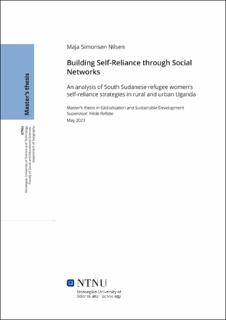| dc.description.abstract | The Ugandan self-reliance strategy is globally recognised for providing refugees with relative protection, freedom of movement, and access to work and services on par with Ugandan nationals. However, the focus remains on creating livelihoods, neglecting social aspects of self-reliance. Additionally, little is known about how different refugee groups fare under self-reliance schemes and the role that social networks play in supporting and providing self-reliance. This study examines the role of social networks in refugee self-reliance strategies in Kampala and BidiBidi refugee settlement with particular attention to gendered effects. The research, conducted from August to October 2022, included 27 semi-structured interviews and three focus group discussions with South Sudanese refugees in Uganda. The findings suggest that social networks are crucial for refugee women in both urban areas and rural settlements to pursue their economic activities while balancing domestic responsibilities, such as childcare and household duties. Social networks also play an important role in promoting the well-being of refugee women by reducing their vulnerability and dependence, while also facilitating social contact and fostering meaningful relationships. Lastly, the study found that social networks and the resources within them were distributed unevenly among refugee women, and that they are neither inexhaustible nor stable sources of support. Disruption of support were related to worsening conditions and long-term lack of essential needs. A conclusion of the thesis is therefore that the Ugandan self-reliance model has differentiated effects and outcomes that need to be assessed in intersectional and contextual ways. Moreover, more attention needs to be paid to social dimensions of self-reliance in humanitarian literature and practice. | |
